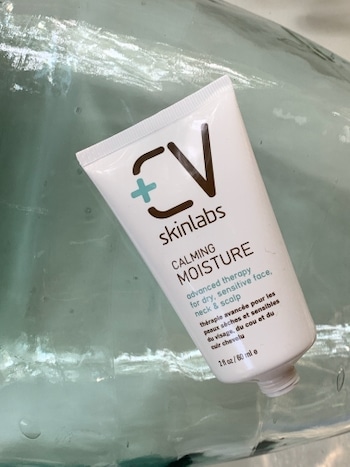
There are many potential causes of itchy scalp.
Until you know which one may be affecting you, it can be hard to treat it.
To help you out, we’ve listed some of the most common causes of itchy scalp here, along with some potential steps you can take to calm that skin down.
Causes of Itchy Scalp #1: Dandruff
If you see flakes on your hair or clothing, and your scalp is dry and itchy, you may have dandruff. This may be caused by irritated, oily skin, dry skin, a yeastlike fungus that feeds on the oils of the scalp, skin conditions like psoriasis and eczema, or sensitivity to hair care products.
To Fix: Most cases of dandruff will improve when you use over-the-counter dandruff shampoo. It helps reduce oil and skin cell buildup. If that doesn’t help, ask your doctor about medicated dandruff shampoo. Feel free to experiment until you find products that work for you.
Causes of Itchy Scalp #2: Hair Care Products
If you have sensitive skin and you’ve noticed a reaction to skincare products, the skin on your scalp may be sensitive too. Maybe the shampoo you’re using is too harsh, or you’re not rinsing it out completely. There may be something in your conditioner or other hair-care product that’s negatively affecting your scalp.
It could also be that you have allergic contact dermatitis, which means your skin reacts when contacting an allergen—like hair dye. Many people are sensitive to hair dye and will develop an itchy scalp after coloring their hair.
To Fix: The key is to stop using the product you’re allergic to. Cut back on everything, including shampoos, conditioners, leave-in treatments, hair sprays, mousses, and other styling products. Get a gentle shampoo and conditioner and start with that. Then gradually add back in your other products, giving yourself a couple of days in between each one so you can detect any that may be bothering you.
 3: Psoriasis
3: Psoriasis
This is a chronic immune disease that causes raised, reddish, scaly patches on the skin and scalp. If you have psoriasis on other areas of your skin and you notice dry, red patches on your scalp, it’s likely the same thing.
To Fix: Start with over-the-counter medicated shampoos. These usually contain salicylic acid or coal tar to help control the flare-ups. If these don’t work, check with your dermatologist for other options.
You can also try some home remedies such as the following.
- Baking Soda: Apply a baking soda paste (baking soda and water) to the affected areas and allow to sit for 5-10 minutes, then rinse off.
- Calming Moisture: Our Calming Moisture is specifically made for the face and scalp. It contains aloe vera, which is known to help heal skin, along with other ingredients to soothe and calm while restoring balance to the scalp. Simply apply to the affected areas and rub in.
- Coconut or avocado oil: Both of these have healthy fatty acids that can encourage skin recovery. Massage a few drops onto the scalp, put on a shower cap, and wait 20 minutes, then wash as usual.
- Oatmeal: Oats are naturally good at relieving itch and irritation. Add some raw ground unflavored oats to a warm bath or hair soak and leave on your head for 15 minutes. (Note: Our CV Skinlabs Calming Moisture contains beta-glucan, which is from oats—another reason it works well for itchy scalp!)
- Epsom salts: These natural salts may reduce psoriasis symptoms. Dissolve some in a warm bath and soak your scalp for at least 15 minutes.
- Restorative Skin Balm: Use our CV Skinlabs Restorative Skin Balm to spot treat psoriasis patches. The castor oil inside it will help soothe and soften, and may even help with hair growth.
Causes of Itchy Scalp #4: Eczema
This is another common skin condition that can cause inflamed, itchy, dry skin to form on the scalp. When it occurs in babies, it’s called cradle cap. In adults, it can be one of several causes of dandruff.
Eczema on the scalp usually occurs because of the overproduction of sebum, the natural oil secreted by the sebaceous glands in the scalp. Symptoms include red and scaly patches of skin on the scalp, itching and burning, and even oozing or weeping lesions.
Eczema reacts to triggers and tends to flare up and then calm down. Potential triggers include hormonal changes, illness, stress, harsh chemicals from shampoos and soaps, and heavy sweating.
To Fix: You can use an over-the-counter dandruff shampoo to get the condition under control. Then keep your skin in its best condition by regularly applying olive oil or our Calming Moisture to the scalp and rubbing it in. Avoid using hair sprays, gels, and other styling products that have harsh ingredients. You can also try taking fish oil supplements—the natural fatty acids are good for the skin.
#5: Diabetes
Is an itchy scalp connected with diabetes? Not something you’d normally think about, but yes—diabetes can affect the nerves in the scalp, causing them to itch.
To Fix: Controlling your diabetes and keeping your blood sugar levels under control can also help control scalp itch. Meanwhile, take care of your scalp with gentle cleansing, thorough rinsing, and the application of natural moisturizing solutions like coconut oil, Calming Moisture, and our Rescue + Relief Spray, which naturally calms the itch.
Some Other Potential Causes of Itchy Scalp
In addition to those listed above, there are some other potential causes of itchy scalp. These include:
 Wig Wearing
Wig Wearing
Wig wearers often experience dry, itchy scalp. Often, this is caused by the fabric of the wig itself. It may also be due to bacterial buildup from sweating under the wig, or reactions to the glue or tape used to keep the wig in place.
To reduce the itch, choose a good quality wig, wear a cotton or silk liner, and if you’re wearing it all day, refresh your scalp several times a day. Our Rescue & Relief Spray works great!
Head Lice
This is caused by tiny insects called lice that get into the hair. They jump from one person’s head to another and are sometimes passed around among young kids in school. If you suspect head lice, talk to your doctor, and use a lice shampoo for treatment.
Scalp Ringworm
This is a type of fungus that can cause a red and itchy rash. Treatment requires prescription medication, so check with your doctor.
Scabies
An intense, annoying itch may be a sign of scabies. These are tiny mites that burrow into the scalp. It’s uncommon to be affected by them, but possible if you come into close contact with someone who has them, or you’ve stayed somewhere that was infested. See your dermatologist, as over-the-counter treatments usually are not effective.
Sensitive Skin
Having sensitive skin, in general, makes you more susceptible to having a sensitive scalp, too. Treat your scalp as you would your skin—use only gentle products, and regularly moisturize.
Shaving Your Scalp
Just like shaving can cause itchy skin on your legs or under the arms, shaving your scalp can also lead to itching and irritation. This is usually a sign of razor burn. To protect your skin, use a fresh, sharp razor or clippers and a soothing shave cream or gel. Rinse, then apply an alcohol-free aftershave or spritz (try our Rescue + Relief Spray) and follow with a non-irritating moisturizer. We recommend our Calming Moisture.
Precancerous Legion
This is less common, but it’s possible. If you see a crusty spot on your scalp that itches, it may be the beginning of skin cancer, caused by years of sun exposure. Check with your dermatologist.
Do you know what’s causing your itchy scalp?

